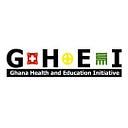GHEI brings COVID-19 Health Advice to Rural Communities in Western North Region, Ghana
Ghana Health and Education Initiative (GHEI) is working closely in partnership with local health officials to protect Western North region’s rural communities from the impact of the deadly coronavirus, COVID-19. Clement Donkor, GHEI’s Country Director explains what action we are taking in that region.
The first case of COVID-19 was confirmed in Ghana on 12th March 2020. By 22nd March, the number of confirmed cases increased to 19. After a span of another 10 days, confirmed cases dramatically increased to 195. At the time of writing, Ghana had recorded 214 total confirmed cases and 5 deaths. The disease is spreading at an alarming rate in Ghana.
Evidently, COVID-19 is an emergency on a scale we have not seen or experienced before. It is one of the most urgent health, economic and social crises Ghana has faced in decades. As the number of people contracting COVID-19 continue to rise in Ghana, so does the risk to people living in rural areas. They are now extremely vulnerable to the spread of the virus and GHEI is deeply concerned about the impact it could have on their livelihoods. The epidemic poses an imminent threat to populations who have inadequate access to health services, have limited capacities and opportunities to cope and adapt, and have limited or no access to technologies. Moreover, the outbreak has the potential to erode development gains made over the years.
Protecting the most Vulnerable
As Ghana embarks on response efforts, the principles of leaving no one behind, non-discrimination and a commitment to universal access to essential services would be a useful basis for effective preparedness and response measures. A targeted inclusive approach is imperative if we are to safeguard and protect the interests of the elderly, women and girls, children, people with disabilities, people who cannot read and people with pre-existing medical conditions.
Right now, GHEI has stepped up preparedness and prevention measures to prevent outbreak clusters and community transmission in our catchment communities. To support preparedness of local health officials and partners in the Bibiani-Anwiaso-Bekwai (BAB) Municipality, we have devised a Risk Communication and Community Engagement Readiness and Response plan for COVID-19. Our preparedness planning for COVID-19 is informed by GHEI’s substantial expertise in public health work and lessons learned. During this emergency, we are supporting the capacities of vulnerable populations and engaging them in decision making processes for response, preparedness and risk reduction.
Communication is Aid
It is critical to communicate to the public what is known about COVID-19, what is unknown, what is being done, and actions to be taken on a regular basis. People have the right to be informed about and understand the health risks that they and their loved one’s face. Our plan ensures that rural communities have the life-saving information they need to protect themselves and others from the virus and to reduce its impact on health, social life, and the economy. We are proactively communicating and engaging with the people especially at-risk populations through two-way communication channels (in person and telephone) in order to alleviate confusion and avoid misunderstandings. We are providing critical information and services through trusted channels of communication and by being responsive, empathetic, consistent and transparent.
We need your help to Respond
Our objective is to foster community agency to contain the spread of COVID-19, ensure participation and build trust. Furthermore, we are committed to designing and implementing community-based approaches to protect rural communities in Western North region at large.
You can help support the COVID-19 response coordinated by GHEI in the Western North region. You can help by –
· Making a donation — All donations go directly to our COVID-19 Emergency Response Fund related activities.
· Partnering with us — GHEI has extensive experience working in rural education and health since 2004, including extensive knowledge of local health systems and extensive community engagement strategies. We stand willing to assist and partner with organizations responding to COVID-19 as this situation continues to develop. Please write to communications@ghei.org to learn how we can together assist the country and rural communities during this challenging time.
